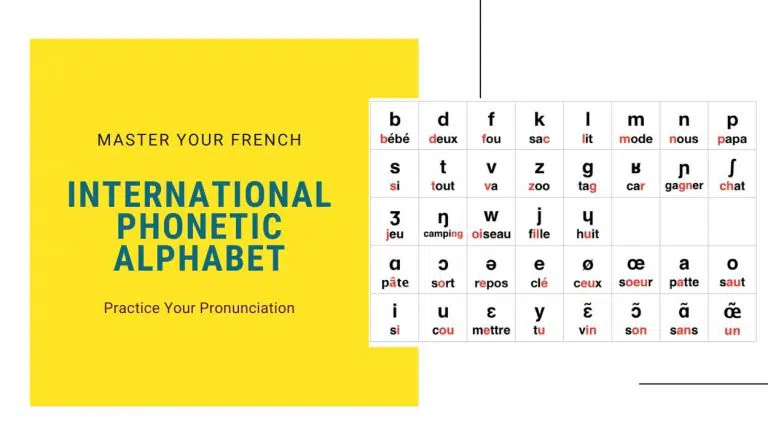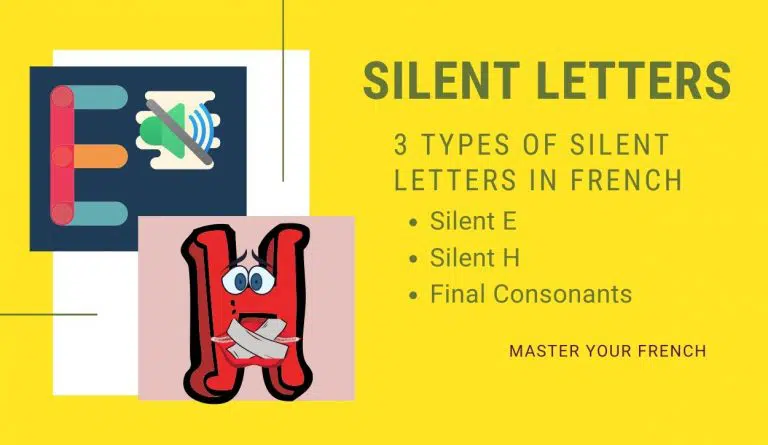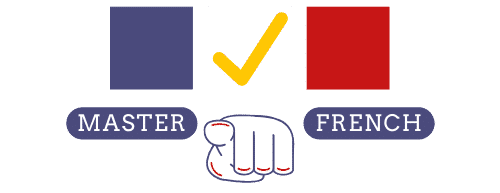The definitive guide to learn French pronunciation
Updated: 11 June, 2022 by Mylene in Pronunciation Lessons ▪

French pronunciation Guide
You spend a lot of time learning French, but you get frustrated when a native French speaker doesn’t understand what you say. Have you ever been in such a situation? Or how about when you’re using the right vocabulary and the right French words but the other speaker isn’t understanding what you’re saying? If so, you’re not alone.
Pronunciation, by definition, is the physical production of sounds and words, correctly, which defines phonetics. Furthermore, French pronunciation is also about paying attention to other additional speech features such as intonation and rhythm.
In this guide, we’ll cover essential items for you to learn French pronunciation:
- What are the top reasons to learn French?
- Why French pronunciation is important?
- How to improve your French pronunciation?
- Curiosity and language learning
- Best way to learn French Pronunciation
- Pronunciation of silent letters in French
- Pronunciation Of Liaison in French
- Enchainement in French pronunciation
- The French assimilation mechanism
- Steps to the right French pronunciation
- French pronunciation videos
What are the top reasons to learn French?
There are plenty of reasons why to learn to speak French fluently. Indeed, learning French is of valuable importance. Half the world’s population is bilingual and French is the official language of 29 countries, across multiple continents, and is spoken by over 274 million people. As a French Language coach helping students to improve their French pronunciation, here are what I see as the best reasons for non-French natives to speak a language besides English.
- You could travel to a French-speaking country and stay there for a short period of time as a tourist, or for a longer period and become a citizen.
- Learning French can boost professional careers at work, it opens new job opportunities, and it can get you hired if you’re starting your career.
- Learning a new language opens new horizons. As a student, it is a great experience to study in France or to follow a French university program. You’ll discover the French culture, improve your French, and also get a professional degree.
- Learning a new language is associated with strengthening cognitive abilities and unlocking intellectual abilities.
But here’s the thing: Learning French is not only about studying vocabulary and expressions. And that might not be a great thing to hear, right? Pronunciation is an important skill to acquire in order to speak a language. We all desperately want to become fluent in French without much effort. And I get it.
Why French pronunciation is important?
Now that you are convinced that learning French is no doubt an investment that you’ll never regret, it is important to know that to speak French understandably, pronunciation is essential. Accurate pronunciation is important if you want to speak French and be understood. Mispronouncing a word or a few sounds in French can prevent effective communication and this is true regardless of the situation and the language.
If you’re looking to learn the right way to pronounce French, this guide to learn French pronunciation is made for you.
Tips to learn French pronunciation
In this pronunciation guide, I’ll show you the various exercises and give you helpful tips to help you perfect your pronunciation. Each point is developed in the following sections.
To make this easy for you, I prepared a video on how to improve your French pronunciation. You can also watch the video below to go through the various points listed in this article.
Watch the video below that is specially made to provide French learners with the steps and the exercises to learn French pronunciation.
Be sure to watch the video on how to improve your French pronunciation and leave a comment. To follow more updates, subscribe to the YouTube channel and follow me on Instagram.
Curiosity is key when learning
When learning a new language, we often look for the best courses, tools, and strategies that could make us move to the next level. This is also true for French learners who are constantly looking for new content, trying to find the right time and the perfect situation to start their learning process.
How curiosity enhances learning French?
Curiosity is key to learning and improving your French pronunciation. Therefore, the first thing you need to do is to understand the characteristics of the French language. For instance, if you are used to pronouncing all the letters in a word in your mother tongue, then it might be difficult for you not to pronounce the last letter in French.

Another common problem is people learning expressions that are no longer used in spoken French today. It could be French expressions learned in schools and you realize that they aren’t used when speaking French in real life.
Once you start being familiarized with modern French and its characteristics, you need to start practicing. You have to:
- Exaggerate your pronunciation
- Train your mouth muscles
- Look silly sometimes (when you exaggerate or when you repeat)
How to improve your French pronunciation?
Practicing is fundamental to getting you sound like a French native. If you’d like to read more about French pronunciation, check out our French pronunciation lessons designed to help you learn and improve your French pronunciation. In practice, to improve your French pronunciation:
- Get curious about pronunciation tips
- Learn the French IPA: the international phonetic alphabet
- Master silent letters in French
- Practice the pronunciation of difficult words
- Take the time every day to learn and repeat
- Follow the rhythm and intonation of the French language
- Understand liaisons and enchainement in French
- Apprehend the mechanism of assimilation in French

You can practice French and learn how to become a better French speaker with the private lessons of Master Your French. Check our private lessons.
The Best Way to Learn French Pronunciation
The best way to learn French sounds is to practice with the International Phonetic Alphabet (IPA). Start listening and repeating French sounds and soon you will be able to pronounce any French word in the dictionary – even if you have never heard it before!
Do you speak English? If you’re reading this article, then there is a big chance that the answer is yes. English speakers, the good news is that you already know how to pronounce 60% of the French Sounds.
IPA to practice French pronunciation
Maybe you’re wondering and asking yourself how to practice French on your own? There are techniques that you could start doing right now in order to improve French pronunciation. You need to practice, record yourself, listen to your pronunciation, and repeat.
To easily practice French sounds with the International Phonetic Alphabet (IPA) watch the video lesson below. I show how to pronounce French sounds with the help of the IPA.

More about French sounds?
I made this easy for you, check my article on the International phonetic alphabet to learn French pronunciation to learn the right way to pronounce.
Basic French pronunciation sounds
In this section, we collected the main rules which are significantly useful when learning the basic French sounds. Understanding the basics is a helpful way to understand the why and the how of words’ pronunciation in French. In particular, you’ll need to learn the sounds associated with French:
- Oral vowels
- Nasal vowels
- Semi vowels or semi consonants
- Nasal consonants
- Oral consonants
Pronunciation of vowels In French
In French, there are the oral vowels and the nasal vowels. Among the 14 vowels in French 11 of them are oral.
For instance, the oral sound /i/ like in samedi (pronounced /samədi/), the oral vowel /u/ like in aujourd’hui (pronounced /oʒurdɥi/), and /ø/ like in monsieur (pronounced /məsjø/).
As for the nasal vowels, there are /ɛ̃/ as in the word ainsi (pronounced /ɛ̃si/), /ɔ̃/ as in the word pont (pronounced /pɔ̃/), and /ɑ̃/ like the word en as in “en un instant”.
Pronunciation of semi consonants or semi-vowels In French
You’ll also find the semi consonants in French. These sounds are the /j/ as in the word grenouille (pronounced /grənuj/), /w/ as in the word droite (pronounced /drwat/), and /ɥ/ as in the word pluie (pronounced /plɥi/).
Pronunciation of nasal consonants In French
The nasal consonants in French are /m/ as in the word maintenant (pronounced /mɛ̃tnɑ̃/), /n/ as in the word non (pronounced /nɔ̃/), /ɲ/ as in the word magnifique (pronounced /maɲifik/), /ŋ/ as in the word parking (pronounced /parkiŋ/).
Pronunciation of oral consonants In French
The oral consonants in French can be an unvoiced consonant : /p/ /t/ /f/ /k/ /s/ /ʃ/ or a voiced consonant /b/ /d/ /v/ /g/ /z/ /ʒ/ /ʁ/ /l/. You’ll find more about their pronunciation in the video and the associated blog addressing the French sounds of the international phonetic alphabet.

How to pronounce these basic words in French
| Words in French | How to pronounce | Example |
|---|---|---|
| Au-dessus | /odəsy/ | L’avion vole au-dessus des nuages. |
| Aujourd’hui | /oʒuʀdɥi/ | Aujourd’hui il fait beau. |
| Baguette | /bagɛt/ | Je voudrais une baguette. |
| Bien | /bjɛ̃/ | Tu as bien entendu. |
| Bienvenue | /bjɛ̃vny/ | Bienvenue chez toi ! |
| Heure | /œʀ/ | Quelle heure est-il? |
| Grenouille | /gʀənuj/ | Je ne mange pas de grenouille. |
| Monsieur | /məsjø/ | Bonjour Monsieur le directeur. |
| Rencontrer | /ʀɑ̃kɔ̃tʀe/ | Je viens de le rencontrer. |
More pronunciation videos?
Check out more pronunciation articles and videos to help you pronounce words in French.
Pronunciation of silent letters in French
Learn how to correctly pronounce words that contain silent letters is a challenge in French! For example, the word blanc ends with the letter -c and in this case, the letter -c is silent. Blanc is pronounced /blɑ̃/. On the other hand, other words such as the word sac end with the consonant -c as well. However, the letter -c is not silent in sac. Sac is pronounced /sak/. You must pronounce it!
Mute H and aspirated H
Did you know that…
The letter -h is usually found at the beginning of a word in French. The letter -h is neither aspirated nor pronounced.
Mute E
The oral vowel -e is the most common silent letter that you will encounter. Though the e muet is the most common term, e instable is the most accurate.
Silent consonants
Of course, they aren’t the only silent letters in French. Silent letters are useful in French. For instance, silent letters are needed to refer to plural in French.
For example: “matin” (in the singular), “matins” (in the plural), the letter -s is not pronounced. In the singular and plural, the word is pronounced / matɛ̃/.
When learning French, it is essential to understand the rules around silent letters. Check “A Guide to Silent Letters in French” to learn more about the rules around the pronunciation of consonants at the end of words in French. You’ll discover the cases where the consonant is pronounced and the cases where the consonant is a silent letter. I’ll also give you the exceptions that you need to know about.
Knowing when to pronounce the silent letters in French is essentially the golden rule of learning to pronounce words in the French language. You can try to guess (or probably not). Plus, even if you try, you really won’t get much for it because there are so many silent letters in the French language.
A video guide on silent letters in French
Spelling words with silent letters is one of the biggest challenges when learning the French language. Correctly pronouncing words with silent letters is a strong indicator that you’re nailing your French accent. This is why you have to check this video lesson in which I explain the basics of pronunciation in French.

Looking for more details?
Check this pronunciation guide to silent letters in French. It will help you better understand silent letters in French which are essential to enhance your pronunciation.
Pronunciation Of Liaison in French
Knowing when to pronounce the liaison in French is one of the main rules of learning to pronounce sentences in the French language.
What is a liaison in French pronunciation?
Did you know that a consonant that is normally not pronounced in French can be pronounced if the word that follows begins with a vowel or silent -h? We call it a liaison.
In making the liaison in French, the consonant that is pronounced becomes part of the syllable of the following word. For example, the letter -t of the word “petit” is silent. Petit is pronounced /pəti/. BUT un petit ami is pronounced /pətitami/. There is a liaison between the words “petit” and “ami”. The silent -t is pronounced /t/.
Be aware that the letter -d is pronounced /t/ while making the liaison in French. For instance, grand avion is pronounced /grɑ̃.tavjɔ̃/.
Mandatory Liaisons in French (a video)
Check the following video to learn more about the rules around French pronunciation and liaisons. You’ll learn as well the right pronunciation of the associated consonants.

What are the different kinds of liaisons in French?
There are three kinds of liaisons in French:
- A French liaison can be a mandatory liaison such as between an adjective and the following noun (“petit ami” is pronounced /pətitami/).
- The liaison can be forbidden, for instance between a singular noun and the verb that follows (la liaison interdite is pronounced la liaison //est interdite). The liaison is forbidden between the noun “liaison” and the verb “est”.
- Lastly, the liaison can be optional, for example after a verb (je vais aller can be pronounced je vais //aller or je vais.Z.aller). Both pronunciations are correct.
Liaisons and French nasal vowels
There are also many specific cases around the pronunciation of the liaison in French such as the pronunciation of French nasal vowels in liaisons.
In some cases :
- the full nasal quality of a nasal vowel is maintained in a liaison context : bien appris is pronounced /bjɛ̃napri/
- and in other cases, the vowels are denasalized : bon ami is pronounced /bɔnami/
Enchainement in French pronunciation
When speaking French, liaisons aren’t the only way that link words to each others. Enchainement in French, is another phenomenon that concerns pronounced consonants and pronounced vowels.
In a rhythmic group, whenever a word ends with a consonant sound and the next word starts with a vowel, the last consonant of the first word becomes the first consonant of the second word : this is an enchainement consonantique in French.
In other words, enchainement involves the resyllabification of a word-final consonant.
Resyllabification occurs thanks to the liaisons but mainly thanks to enchainements.
For example : “pour elle”, the consonant -r in “pour” is always pronounced. The word that follows begins with a vowel. In this group, pronounce the letter -r in “elle” not as part of “pour”, but rather with the vowel -e in “elle”. The word-final consonant -r is resyllabified with the initial vowel -e of a following word. It sounds like this : pou.Relle.
Vowels are also concerned with enchainement. Whenever a word ends with a vowel sound and the next word starts with a vowel, we pronounce an enchainement. This vowel sequencing is called enchainement vocalique in French.
To help you understand these concepts and start hearing them when listening to a French discussion, I encourage you to watch one of the story reading session videos. In these videos, I explain various characteristics of the French language and pronunciation tips that are present in the text I read.

Assimiliation mechanism in French
The mechanism of assimilation is a change in the sound linked to and presumably caused by another close sound. In fact, whenever 2 sounds are close to each other within the same word or in a sequence of words, they influence each other.
For example, in the French word médecin (pronounced /metsɛ̃/) the letter -e is not pronounced. In this case, the sound /s/ causes a change in how the letter -d is pronounced. The sound of the letter -d changes and becomes /t/ in this word. There are many examples that I show in the following video about the pronunciation of different sounds that are close to each other.

Steps to the right French pronunciation
There is no doubt that French has many words that are particularly difficult to pronounce for prospective speakers. As accurate pronunciation is important to speak French and be understood, practicing will get to the right pronunciation of many words and sounds in French. I’d divide this process of learning French pronunciation into a number of steps.
Step 1 – Pronunciation muscles
First, it is important to understand that you need to reshape the way you move the muscles of your mouth. Building new pronunciation muscles is not easy. It is a physical activity that requires consistent exercise.
Step 2 – French specific sounds
Second, be sure to learn the new sounds that are proper to the language that you’re learning. In French, it is essential to learn how to pronounce the nasal vowels to produce the French sounds “on“, “an“, “in” as well as learning sounds that don’t exist in other languages such as the French “u” that doesn’t exist in English.
Step 3 – From sounds to words
Third, once you learn to pronounce the various sounds the next step is to include these sounds into real words. Start practicing the pronunciation of French words so that you build the right pronunciation patterns. You can embrace tongue twisters. It is a well-known technique for actors and comedians but not only.
Step 4 – Practice with difficult words
What’s better than practicing with words that are notoriously hard to pronounce in French? First, try to understand what makes these words difficult to pronounce and what sounds you need to be aware of its pronunciation. Once this is clear for you, practicing will be much easier and you’ll be able to master the pronunciation of the trickiest words in French.
Ready for the challenge?
Among other French words, learn how to pronounce in French words such as “accueil”, “magnifique”, “fouiller”. Check the full post on difficult words to pronounce in French and you’ll learn a lot on the French pronunciation.
French pronunciation videos
Videos are a great way to practice and improve pronunciation. Learn French pronunciation with the effortless French pronunciation series, you’ll get access to numerous video exercises to teach you how to pronounce words in French.
These pronunciation videos are published on Instagram and a best-of selection is shared with the readers of the master your French blog. Regardless of the medium, the goal is to teach the different French sounds for free.
The format of the videos on Instagram is short and mainly these pronunciation exercises are divided into 2 groups:
- Hear the difference in pronunciation: The focus of the videos in this group is to teach French learners how to exercise their listening skills and their French pronunciation.
- Pronunciation the right way: The second group of exercises highlights the importance of being mindful of the numerous French sounds, words, and sentences and how to pronounce them.
In each short lesson, either I compare the pronunciation of two words or I teach you how to pronounce a word or short sentence in French. Examples of what you should expect are:
- De vs. deux: How are they different?
- How to pronounce ainsi in French?
- How to make the liaisons in en un instant in French?
- How to pronounce Tour Eiffel in French?
The meaning of the French word is translated into English and completed with other useful detailed explanations that are part of this description associated with each video post. Enjoy!
Next Steps to better French pronunciation
Learning a new language could be life-changing. Take the opportunity to strengthen your French skills and in particular your French pronunciation.
This is one of the most remarkable things you can do for yourself. It is never too late to start perfecting your pronunciation of French.
Also don’t miss the regular pronunciation lessons and quizzes on Instagram and the pronunciation videos on YouTube. I’d be glad to help to make your French pronunciation brilliant.
If you need any help in improving your French pronunciation, Master Your French offers a membership program to teach French learners the right pronunciation. Check out our online French courses.



thanks so much
Hello! Thank you for the comment. A très bientôt!
thank so much. this article is really helpful.
thank you very much !
Thanks so much. This is very helpful
Hello Belinda! Thank you for the comment. A très bientôt!